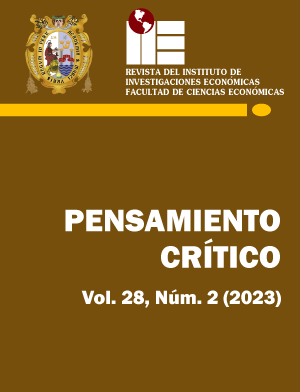An analysis of Public Expenditure and Economic Growth, case of Ecuador period 2000-2022
DOI:
https://doi.org/10.15381/pc.v28i2.25830Keywords:
Ecuador, Public Expenditure, Economic Growth, Wagner's Law, Keynesian HypothesisAbstract
This article analyzes the relationship between government spending and Ecuadorian economic growth from the first quarter of 2000 to the fourth quarter of 2022. The objective of this study is to test two competing theories. On the one hand, Wagner's Law (1890) defends the idea that variations in public spending are caused by economic growth. And, on the other hand, the Keynesian hypothesis (1937) which postulates that economic growth is a product of government spending. With this objective, the total expenditure is considered, as well as the different types of expenditure, for which some tests are carried out, including the cointegration analysis applying the Engle and Granger methodology, the Zivot-Andrews test, the Johansen, among others. The main results show that the Keynesian hypothesis is not fulfilled between the years 2000 and 2020 and Wagner's law is fulfilled if the total government expenditure is considered, as well as when only the current expenditure of the Ecuadorian government is considered.
Downloads
Published
Issue
Section
License
Copyright (c) 2023 Kevin Gómez-Bermeo, Santiago Sarmiento Moscoso

This work is licensed under a Creative Commons Attribution-NonCommercial-ShareAlike 4.0 International License.
THE AUTHORS RETAIN THEIR RIGHTS:
a. The authors retain their trademark and patent rights, and also on any process or procedure described in the article.
b. The authors retain the right to share, copy, distribute, execute and publicly communicate the article published in Pensamiento Crítico (for example, place it in an institutional repository or publish it in a book), with recognition of its initial publication in Pensamiento Crítico.
c. The authors retain the right to make a subsequent publication of their work, to use the article or any part of it (for example: a compilation of their works, notes for conferences, thesis, or for a book), provided they indicate the source of publication (authors of the work, journal, volume, number and date).






